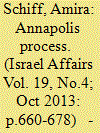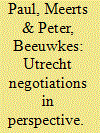| Srl | Item |
| 1 |
ID:
126726


|
|
|
|
|
| Publication |
2013.
|
| Summary/Abstract |
The analysis indicates three sets of factors through which parties' willingness to achieve a consensual solution can be assessed: the contextual factors that contribute to adversaries' decision to proceed to official negotiations, the functions of the pre-negotiations and the changes that occur in the parties' perceptions during the pre-negotiations. A simultaneous exploration of these factors provides a more complete assessment of the parties' intentions and their willingness to proceed to negotiations directed at a win-win solution. This, in turn, enables a better understanding of the factors that undermine de-escalation initiatives, not only between Israel and the Palestinians but in other intractable conflicts as well.
|
|
|
|
|
|
|
|
|
|
|
|
|
|
|
|
| 2 |
ID:
178682


|
|
|
|
|
| Summary/Abstract |
Pre-negotiation is widely accepted as a means to convince intrastate conflict parties to negotiate formally; however, research has not yet established a causal link between early efforts to bring warring parties together and the outcome of any negotiated settlement. This gap begs the question: To what extent do activities during the pre-negotiation phase contribute to the signing of a peace agreement? Theory on interstate conflict suggests that pre-negotiation reduces risk, thereby convincing conflict parties that they have more to gain from negotiating than from fighting. However, in conflicts between governments and non-state armed actors, this article argues that reciprocity paves the way for reaching peace agreements. This article introduces a new dataset on pre-negotiation including nearly all intrastate armed conflicts between 2005 and 2015. Confirming previous findings, mediation is significantly and positively correlated with reaching a type of peace agreement; conflicts over government are more likely to end in a negotiated agreement than conflicts over territory or both government and territory. In contrast to existing qualitative research, this study finds little evidence that pre-negotiation increases the likelihood that conflict dyads sign peace agreements. Future quantitative research on this topic requires more nuanced measures of the conditions under which conflict parties shift from unilateral to joint decisionmaking.
|
|
|
|
|
|
|
|
|
|
|
|
|
|
|
|
| 3 |
ID:
084416


|
|
|
|
|
| Publication |
2008.
|
| Summary/Abstract |
The Peace Negotiations in the Dutch city of Utrecht (1712-13) and its preliminaries settled the Spanish War of Succession and were used to deal with leftovers of the Westphalia Treaties. More importantly, the peace talks in Utrecht gave the major West European powers the opportunity to create an international framework enhancing stability and cooperation in Europe. The Utrecht talks are analyzed to assess the evolution of the negotiation process. The discussion enhances our understanding of international interstate negotiation processes of the past and, thereby, of the present.
|
|
|
|
|
|
|
|
|
|
|
|
|
|
|
|